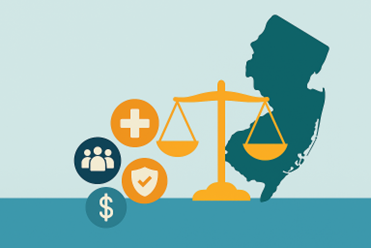
Arbitration Agreements: A Tale of Two States
August 12, 2024
WFH? You (Still) Have Rights!
August 20, 2024By: Ty Hyderally, Esq. and Faatimah Jafiq
August 9, 2024
Breaks and Schedule Changes:
In New Jersey, breaks are only mandated for minors under the age of 18. For everyone else, company policy dictates the amount of breaks an employee may take. The employer has full discretion regarding scheduling of work for the employee, but any significant decrease in hours worked can make the employee eligible for unemployment benefits at the employer’s expense.
In New York, generally employers must provide at least 30 minutes of unpaid time off to an employee who works more than 6 consecutive hours in a shift that starts before 11:00 AM and extends past 2:00 PM. Retail workers are entitled to 72 hours’ notice of a shift change and fast-food workers are entitled to 14 days’ notice of their work schedule.[1]
Sick Leave and Leave of Absence: The Family and Medical Leave Act (FMLA) provides job protection to eligible workers who need to take unpaid leave for family and medical reasons for up to 12 weeks in a 12-month period. The leave can be for reasons such as: serious health conditions preventing the employee from performing essential job duties; birth of a child or caring for a newborn; providing care for a child, parent, or spouse with a health condition; and more.
In New York, the laws regarding sick leave are generally the same for New York City and New York State. New York City’s Earned Safe and Sick Time Act (ESSTA) was amended in 2023 to clarify how it applies to specific employers.[2] There are different hour requirements based on the number of employees. For example, employers with 100+ employees must provide up to 56 hours of paid leave each calendar year.[3] However, this does not apply to remote workers who perform work while physically located outside of New York City. A remote worker who “regularly” performs[4] or is expected to regularly perform work in New York City may be covered by the ESSTA; however, only hours worked within New York City can count toward the accrual of sick time.
In New Jersey, employers must provide up to 40 hours of earned sick leave regardless of the size of the employer.[5] This applies to full-time, part-time, and temporary employees.
Overtime Pay: The requirements surrounding overtime pay vary depending on the state you are in. The FLSA requires employers to pay eligible employees time and a half for any work done beyond the standard 40-hour work week. This also applies to both New York and New Jersey employees.[6]
Discrimination and Harassment: The New Jersey Law Against Discrimination (“LAD”) prohibits conduct that is intended to treat people differently based on their protected status as well as policies that “disproportionately affect those in a protected class.”[7] The LAD protects any employee with ties to a New Jersey employer, whether they live in New Jersey or outside New Jersey. However, it does not extend to New Jersey residents who work for an employer based in another state. These employees must “establish a nexus” between the NJ LAD and their employer in order to make a claim under the LAD.[8]
In New York, to be protected under the New York State and New York City human rights laws, a non-resident must show that the alleged discriminatory conduct had an impact in New York.[9] The Court held that a non-resident’s “occasional meetings or travel to the city are tangential and do not satisfy the impact requirement.”[10]
Employee Privacy: The Electronic Communications Privacy Act of 1986 (ECPA) allows employers to monitor electronic communications to fulfill a legitimate business purpose. It also includes a consent exception, which allows employers to monitor electronic communications provided they have their employees’ consent to do so.
In New York, employers must disclose any form of electronic monitoring to new hires and once annually to the entire company.[11]
New Jersey has no specific protections for electronic monitoring or privacy for remote workers.
Where to go: If you are in New Jersey or work for a New Jersey employer, you may file a complaint with the NJ Division of Civil Rights. In New York City there is the NYC Commission on Human Rights. In New York State there is the New York State Division of Human Rights.
You should consult with a lawyer concentrating in employment law to discuss your options.
En nuestra firma hablamos español. This blog is for informational purposes only. It does not constitute legal advice, and may not reasonably be relied upon as such. If you face a legal issue, you should consult a qualified attorney for independent legal advice with regard to your particular set of facts. This blog may constitute attorney advertising. This blog is not intended to communicate with anyone in a state or other jurisdiction where such a blog may fail to comply with all laws and ethical rules of that state of jurisdiction.
[1] See New York Wage Resources link above in footnote 5.
[2] Information for Workers on Paid Safe and Sick Leave: https://www.nyc.gov/site/dca/workers/workersrights/paid-sick-leave-law-for-workers.page
[3] ESSTA clarifies that the overall number of employees is determined by an employer’s total number of employees nation-wide. This includes employees who are full-time, part-time, on leave, on suspension, and jointly employed. (see link above in footnote 8)
[4] This is determined on a case-by-case basis. An out of state employee who goes to the City once or twice a year is not covered under the Act, but an out of state employee who travels into the city multiple times a week or month could be covered.
[5] NJ Earned Sick Leave: https://www.nj.gov/labor/myworkrights/leave-benefits/sick-leave/
[6] New York Wage Resources: https://ag.ny.gov/resources/individuals/workers-rights/wages-pay
New Jersey Wage Resources: https://www.nj.gov/labor/myworkrights/wages/wages.shtml
[7] Overview of New Jersey Law Against Discrimination: https://www.njoag.gov/about/divisions-and-offices/division-on-civil-rights-home/employment-discrimination/
[8] New Jersey Division on Civil Rights Guidance on Discrimination and Out-of-State Remote Workers: https://www.njoag.gov/wp-content/uploads/2024/05/2024-05-07-DCR-Guidance-on-Remote-Work.pdf
[9] 15 N.Y.3d 285, 291 (2010); see also Wolf v. Imus, 110 N.Y.S.3d 796 (Table), at *2 (Sup. Ct. N.Y. Cnty. 2018)
[10] 2022 WL 1173433, at *3 (S.D.N.Y. Apr. 20, 2022). (citing Hoffman, 15 N.Y.3d at 292).
[11] This was effective as of May 7, 2022. https://legislation.nysenate.gov/pdf/bills/2021/S2628


